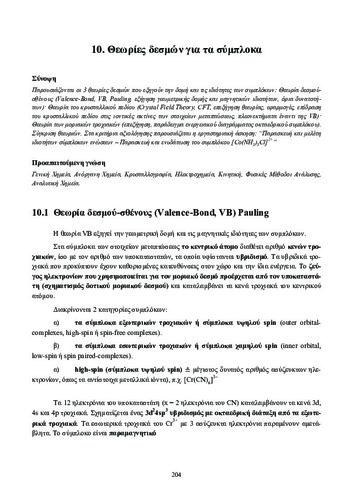| Title Details: | |
|
Bonding theories for complexes |
|
| Authors: |
Ochsenkuehn-Petropoulou, Maria |
| Reviewer: |
Beazi Katsioti, Margarita |
| Subject: | NATURAL SCIENCES AND AGRICULTURAL SCIENCES > CHEMISTRY > INORGANIC CHEMISTRY NATURAL SCIENCES AND AGRICULTURAL SCIENCES > CHEMISTRY > PHYSICAL CHEMISTRY > THEORETICAL CHEMISTRY > SOLID STATE CHEMISTRY |
| Keywords: |
Bonding Theories For Complexes
Valence-bond Theory Crystal Field Theory Molecular Orbital Theory Advantages Of The Three Theories Disadvantages Of The Three Theories |
| Description: | |
| Abstract: |
Valence-Bond Theory (VB, Pauling, explanation of the geometric structure and the magnetic properties of complexes, limits). Crystal Field Theory (CFT, theoretical approach, applications, influence of the crystal field on the ionic radii of the transition elements, advantages towards VB theory). Molecular Orbital Theory (MO, theoretical approach, example of the energy diagram of an octahedral complex). Comparison of the theories. Demonstration of the lab exercise:
“Preparation and investigation of complex compounds-Preparation and hydration of the complex [Co(NH3)5 Cl] 2+”. |
| Linguistic Editors: |
Ochsenkuehn, Eleni Elissavet |
| Technical Editors: |
Serafeim, Athanassios |
| Type: |
Chapter |
| Creation Date: | 2015 |
| Item Details: | |
| License: |
http://creativecommons.org/licenses/by-nc-nd/3.0/gr |
| Handle | http://hdl.handle.net/11419/813 |
| Bibliographic Reference: | Ochsenkuehn-Petropoulou, M. (2015). Bonding theories for complexes [Chapter]. In Ochsenkuehn-Petropoulou, M. 2015. Advanced Inorganic Chemistry [Undergraduate textbook]. Kallipos, Open Academic Editions. https://hdl.handle.net/11419/813 |
| Language: |
Greek |
| Is Part of: |
Advanced Inorganic Chemistry |
| Publication Origin: |
Kallipos, Open Academic Editions |


